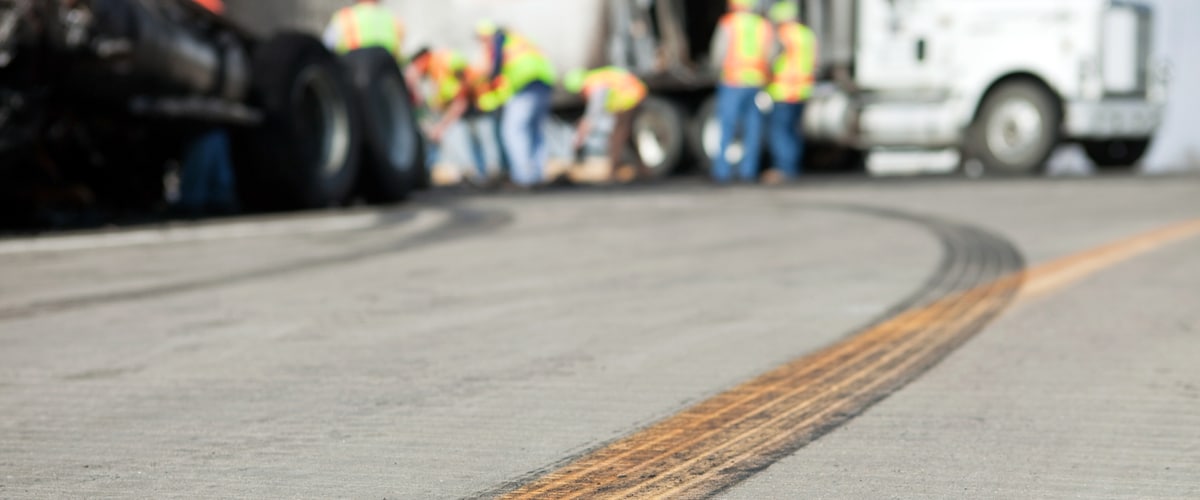
Request Free Consultation
To get answers to questions about your injury, contact Catalano Law for a FREE case evaluation. We’ll assess your case, explain your legal options, and recommend the next steps at no cost. We’re here when you need us.
Contact Form
General Contact Form

If you regularly drive on I-81 in Upstate New York, you’re used to seeing large trucks. They’re unavoidable and often intimidating. Car accidents are dangerous enough, no matter who is involved. But when big trucks cause a collision, the injuries can be catastrophic or even fatal.
According to the Institute for Traffic Safety Management and Research (ITSMR), the state recorded 2,958 injuries and 76 fatalities from large truck crashes in 2020.
Knowing how big truck accidents differ from other vehicle collisions and what to expect when dealing with a trucking company’s insurer can help you get compensation for your injuries.
Why Big Truck Accidents Are More Severe Than Car Accidents
One of the biggest differences between a standard passenger car and a large semi-truck that pulls trailers is size and weight. According to EPA estimates, the average weight of passenger cars and light trucks made since 2010 has risen from 4,100 lbs to 4,177 lbs in 2020.
In contrast, big trucks are medium- or heavy-duty trucks per the FHWA Gross Vehicle Weight Rating classes. These trucks start at 10,000 lbs. and can weigh over 60,000 lbs.
Due to their increased size, length, and weight, large trucks need an extended braking distance to bring the vehicle from a given speed to a stop, particularly at typical highway speeds (60 mph or higher). According to the FMCSA, a large truck may need up to the equivalent of two football fields (about 240 yards) to brake from highway speeds to a complete, safe stop.
Big trucks carry more momentum and cause more damage to the objects and vehicles they impact. Occupants of smaller vehicles are at heightened risk of injury or death when hit by a big rig.
Types of Injuries in Big Truck Accidents
Victims of big truck accidents often suffer life-altering injuries. The Federal Motor Carrier Safety Administration reports that out of the 1.12 fatal semi-truck crashes in 2020, 83% of the fatalities were not occupants in the truck. Common injuries suffered by those in big truck accidents include:
- Cuts and lacerations: A big truck crashing into a smaller vehicle often causes projections of shattered auto glass and metal fragments, causing laceration injuries and often leaving visible scarring.
- Fractures: The amount of blunt force transferred from a truck impacting another vehicle is powerful enough to break bones.
- Burns: Many big trucks haul flammable cargo and other hazardous goods, such as gasoline. If these trucks are involved in an accident, other road users are at increased risk of burn injuries.
- Whiplash and neck injuries: When a large truck rear-ends another vehicle, the impact force can cause a whiplash injury to the other vehicle’s occupants.
- Internal organ damage: A semi-truck crash can result in blunt force trauma to a passenger vehicle occupant’s body, damaging internal organs and resulting in internal bleeding, even if no other injuries are visible.
- Traumatic brain injury (TBI): In the most severe crashes, a big truck crashing into another vehicle may directly impact the crash victim’s head or skull, potentially causing a traumatic brain injury.
Who is Liable in a Big Truck Accident?
Most big trucks in the United States are legally classified as Commercial Motor Vehicles (CMV) and operated by a trucking company. When a CMV is involved in a traffic accident, one or multiple parties may be responsible for the crash, usually more than in a typical car crash.
Potential parties liable for a big truck accident include the following:
Trucking Companies
In many big truck accidents, the driver may not be directly responsible for a big truck accident. For instance, if the crash was caused by an overloaded truck, failure to maintain the truck properly, or failing to give truck drivers sufficient rest time, the company may be responsible instead of the driver.
Dealing with a trucking company as a victim of a big truck accident can be more challenging than filing a claim against another passenger car driver. Unlike a typical car crash case, big truck accidents often require you to communicate with insurance companies that serve businesses instead of individuals. They may be more persistent about getting you to settle for less than you are owed.
For example, a trucking company insurer may contact you to get you to admit guilt or look through your social media for evidence that you aren’t as injured as you claim.
An attorney from Catalano Law can protect your rights by handling all communication between you and the insurance company. They can also ensure you file the appropriate paperwork and submit evidence supporting your claim.
Seek Expert Counsel From Catalano Law Today
If you were injured in a big truck accident in Upstate New York, it is critical to contact a team of expert attorneys to represent your interests.
The experienced truck accident attorneys at Catalano Law can review your case, determine the at-fault party’s liability, and help get your life back on track by seeking maximum compensation on your behalf.
Contact us today to schedule a free phone, live chat, or email consultation.

